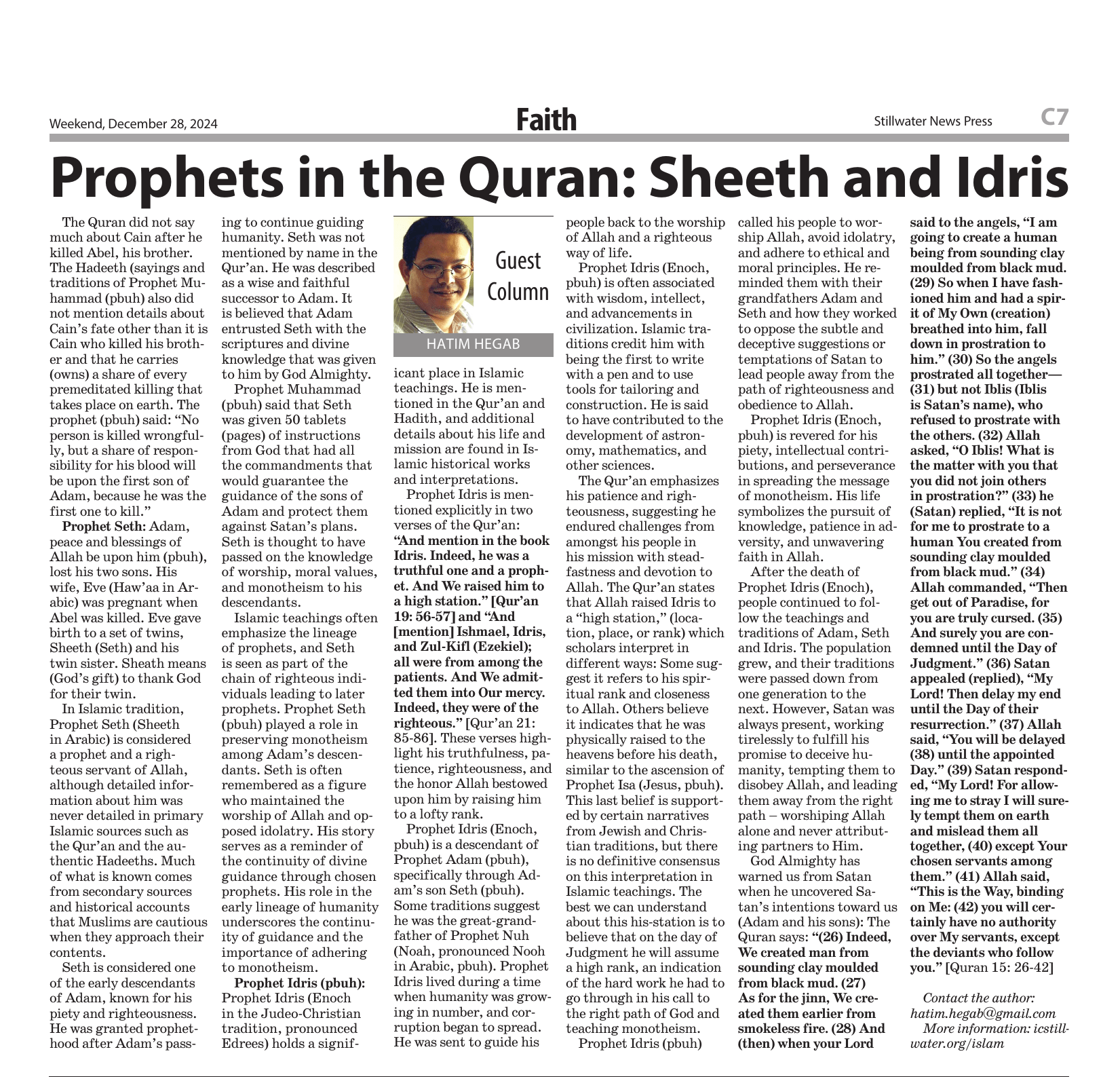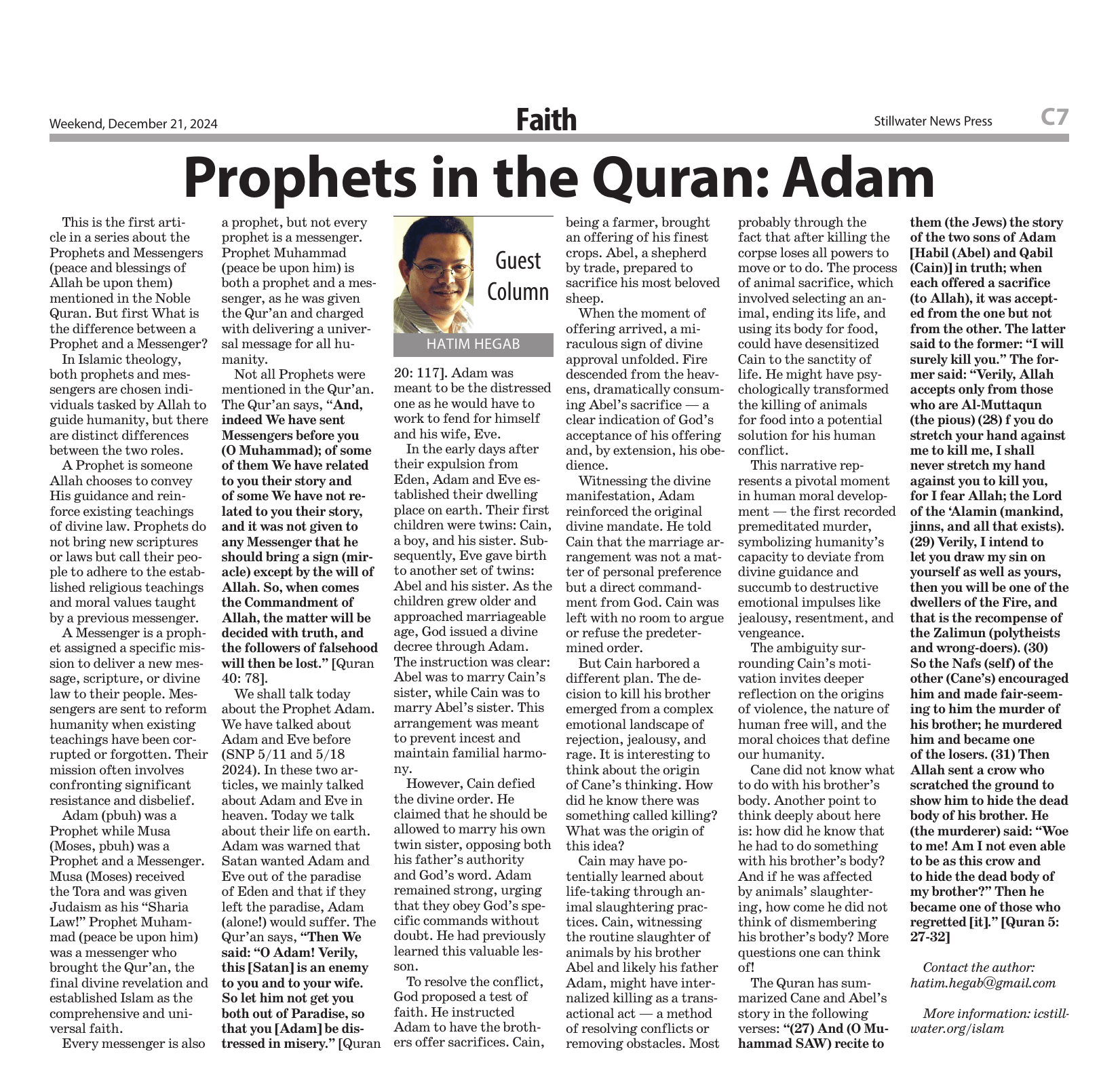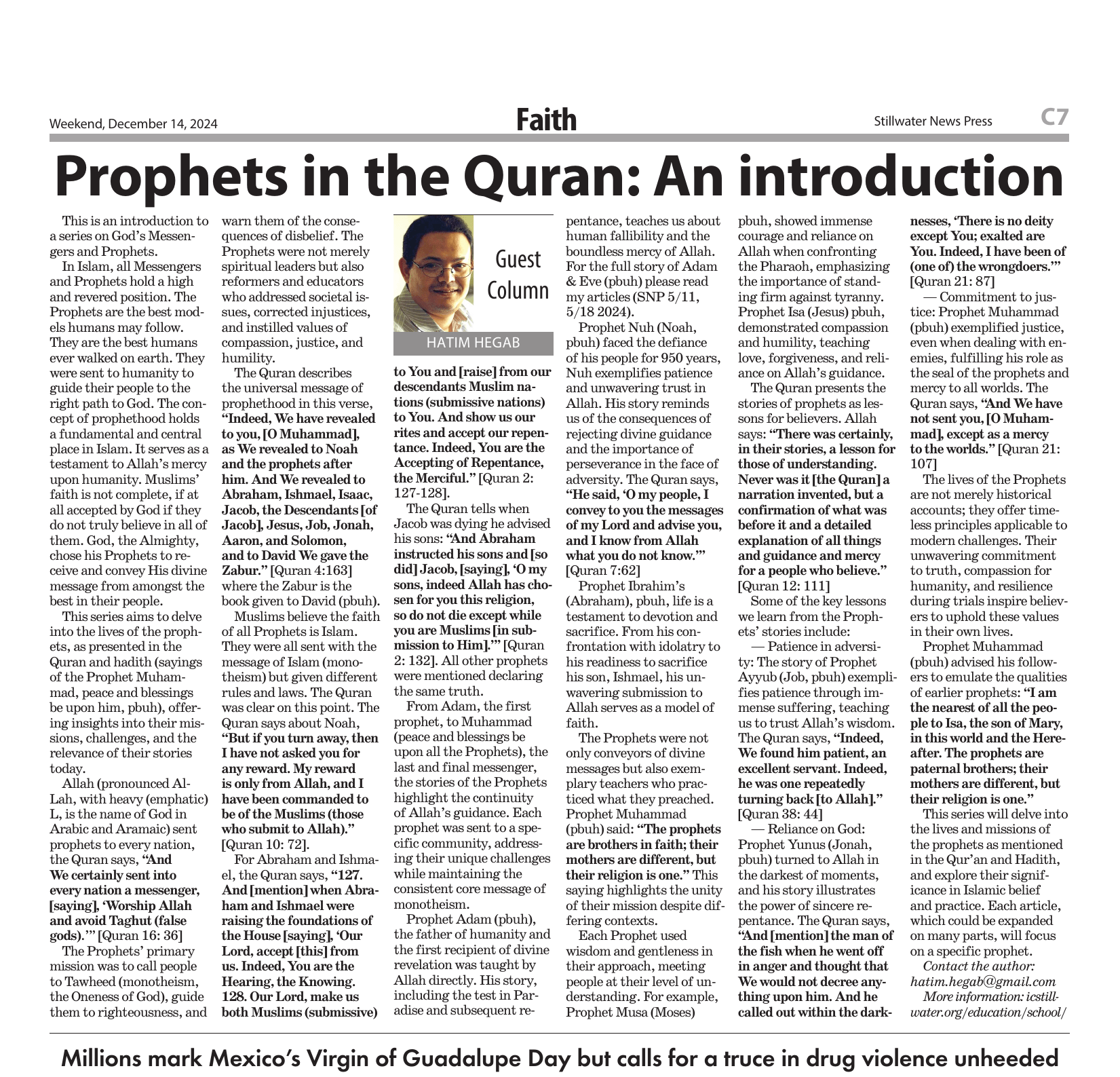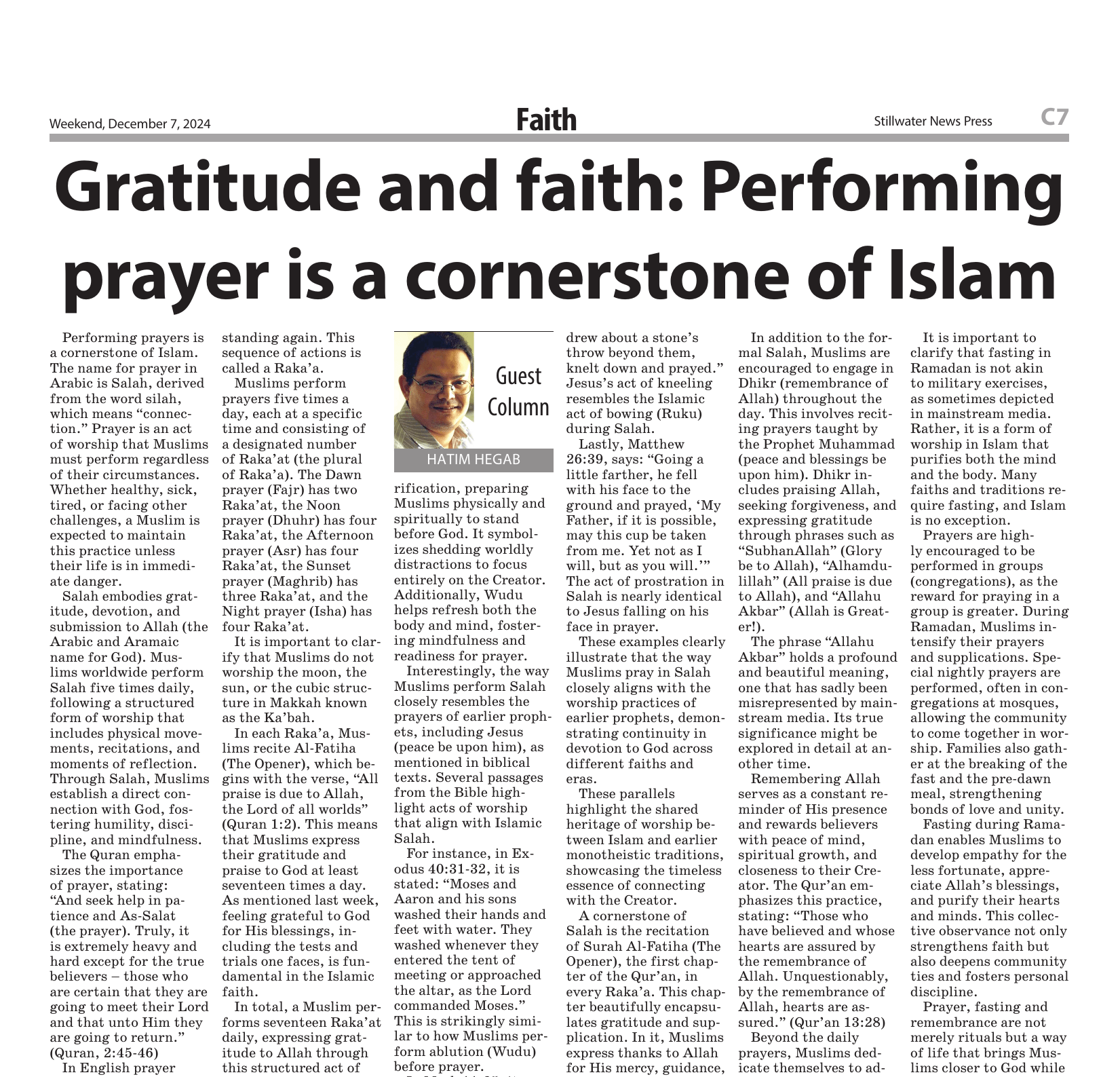12/28/2024 @ 12:39 pm
New Article Published
Dr. Hatim Hegab continues to contribute to the Faith page of the local newspaper, “The Stillwater News Press.” In his latest article, he talks about “Prophets in the Qur’an: Sheet and Idris”:
Prophet Sheeth (Seth), regarded in Islamic tradition as one of the righteous descendants of Adam, is mentioned indirectly in the Qur’an through references to the lineage of prophets. He was chosen by Allah to continue the guidance of humanity after Adam’s passing. Islamic narrations describe Sheeth as a wise and devout prophet who taught people about worship, morality, and obedience to Allah. He is credited with introducing early forms of civilization, including knowledge of agriculture and tools, and he maintained the monotheistic practices established by his father, Adam. His efforts were particularly important in preserving the pure worship of Allah, as idolatry and corruption had not yet taken root during his time.
Prophet Idris (Enoch), explicitly mentioned in the Qur’an, is praised for his truthfulness, patience, and elevated status among prophets. Allah says in Surah Maryam (19:56-57): “And mention Idris in the Book. Indeed, he was a man of truth and a prophet. And We raised him to a high station.” He is also referred to in Surah Al-Anbiya (21:85) as among those steadfast in patience. Islamic tradition associates him with advancements in writing, astronomy, and tailoring, reflecting his contributions to human knowledge and civilization. Prophet Idris’s life exemplifies a profound devotion to Allah and a commitment to guiding his people toward righteousness. His elevated rank signifies the honor Allah bestows upon those steadfast in their faith and dedication. Together, the stories of Sheeth and Idris highlight the importance of preserving divine guidance and contributing positively to society.
For now, Dr. Hegab’s articles on political issues are not included in this list of his articles.
12/21/2024 @ 3:24 pm
New Article Published
Dr. Hatim Hegab continues to contribute to the Faith page of the local newspaper, “The Stillwater News Press.” His latest article discusses “Prophet Adam (pbuh)”.
Prophet Adam, the first human and prophet, holds a significant place in the Qur’an as the father of humanity and the first to receive divine guidance. Among the many lessons drawn from his life is the story of his two sons, often identified as Habil (Abel) and Qabil (Cain). This story, mentioned in Surah Al-Ma’idah (5:27-31), highlights the themes of envy, righteousness, and consequences of disobedience. When both sons were instructed to offer sacrifices to Allah, Habil’s sacrifice was accepted due to his sincerity and piety, while Qabil’s was rejected because of his lack of devotion. Instead of seeking repentance or improving himself, Qabil succumbed to envy and anger, plotting against his brother. This jealousy culminated in Qabil committing the first murder in human history, illustrating the destructive nature of unchecked emotions and the importance of self-restraint.
The Qur’an describes how Qabil was overcome with regret after his crime but did not know what to do. Allah sent a crow scratching the ground to show Qabil how to bury his brother, teaching humanity the concept of burial. This act emphasized not only the gravity of taking a life but also the value of preserving human dignity, even in death. The story of Adam’s sons serves as a powerful reminder of the dangers of jealousy, arrogance, and the failure to control one’s desires. It also underscores the Qur’anic principle that true virtue lies in one’s righteousness and sincerity toward Allah, not external deeds devoid of faith. Through this narrative, believers are reminded to seek Allah’s guidance in moments of conflict and to uphold justice and compassion in their dealings with others.
For now, Dr. Hegab’s articles on political issues are not included in this list of his articles.
12/14/2024 @ 10:29 am
New Article Published
Dr. Hatim Hegab continues to contribute to the Faith page of the local newspaper, “The Stillwater News Press.” In this article, he talks about “Prophets in the Qur’an”:
Prophets in the Qur’an hold a central place in Islamic teachings, serving as messengers chosen by Allah to guide humanity toward truth and righteousness. Their stories, spread across the Qur’an, emphasize moral lessons, unwavering faith, and divine wisdom. From Adam, the first prophet and father of humanity, to Muhammad ﷺ, the final messenger, the Qur’an recounts their trials, sacrifices, and unwavering commitment to Allah’s command. These narratives are not merely historical accounts but serve as enduring lessons for all generations, highlighting the virtues of patience, humility, and reliance on Allah. Each prophet was entrusted with a mission suited to their time and community, yet their core message was universal: worship Allah alone and lead a life of righteousness.
The Qur’an mentions 25 prophets by name, including Noah (Nuh), Abraham (Ibrahim), Moses (Musa), and Jesus (Isa), with each embodying unique qualities and challenges that resonate across different contexts. These prophets exemplify the human struggle to uphold divine principles amidst adversity and opposition. For instance, Prophet Ibrahim’s unyielding monotheism in the face of idol worship, and Prophet Musa’s confrontation with Pharaoh, illustrate the triumph of faith over tyranny. By reflecting on these accounts, believers are inspired to cultivate similar resilience and devotion in their own lives. This series of articles will delve into the lives and missions of these prophets, drawing insights from Qur’anic verses and authentic hadiths, and offering a deeper understanding of their significance in Islam.
For now, Dr. Hegab’s articles on political issues are not included in this list of his articles.
12/07/2024 @ 11:39 am
New Article Published
Dr. Hatim Hegab continues to contribute to the Faith page of the local newspaper, “The Stillwater News Press.” In his latest article, he talks about “Gratitude and Faith. An Islamic Perspective, Part 2”:
For now, Dr. Hegab’s articles on political issues are not included in this list of his articles.



